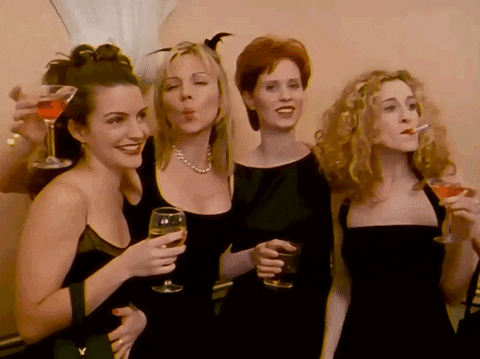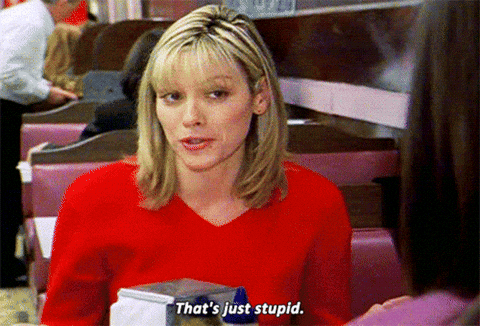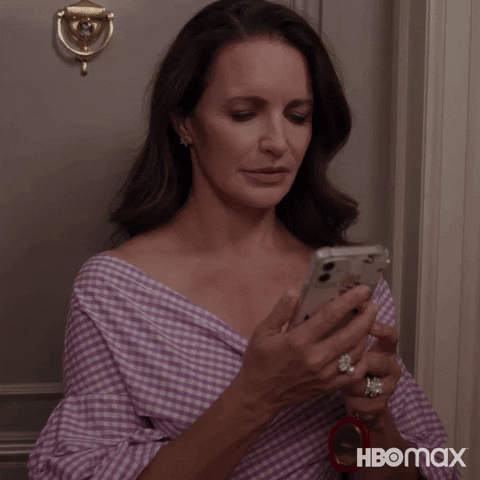Carrie, Miranda, Charlotte, Samantha…the most iconic foursome of fabulousness, relationships (or situationships) and careers came to an end in 2004. What started out as an honest and hilarious comedy that pioneered female sexuality, was more of a melodrama by the time Carrie returned to New York from Paris. Sometime later, Hollywood graced us with two feature films, “Sex and the City” and “Sex and the City 2,” the second of which was a major flop. I revisited the original show for the umpteenth time early this fall, just in time for the premiere of the reboot, “And Just Like That.”
This time, I watched it not as a single 20-something comparing my nights-in to Miranda’s chocolate and TiVo-only Saturdays, but as a married 30-something with a matured awareness of inauthentic character development. I realized Carrie Bradshaw (Sarah Jessica Parker) is probably the worst character of the bunch, even trumping Mexico-shaming Charlotte (Kristin Davis). Samantha (Kim Cattrall) and Miranda (Cynthia Nixon) are arguably the best, most honest—whether you agree with them or not.

The show opens with the infamous Parker and Cattrall drama, with Carrie, rather than taking the high road, attempting to tarnish Samantha’s name based solely on a career change. We’re told that Samantha ditched all three of her friends and left for London after Carrie leveled up in her own career and no longer needed Samantha to represent her.
First of all, not only did this do the opposite and make SJP look bad, but that is completely unlike the character of Samantha Jones. Samantha wasn’t just the free sexual spirit and comedic relief, she was also a ball-busting, no-nonsense businesswoman who understood corporate tactics and would have supported Carrie (as she so often did) no matter what. Lastly, Carrie’s passive petty party does one thing I cannot stand: she shames her friend for moving on to bigger and better things. Then again, Carrie is selfish asf.

If anything, this passive aggressive attack backfired, starting the #teamsamantha Twitter buzz. This choice for Samantha’s story arc not only doesn’t make sense, it just made for bad writing. Wouldn’t it have made more sense for Samantha’s cancer from the original show to return? Prompting Charlotte to cryptically say, “she’s no longer with us”?
In the second episode (spoiler alert) Carrie mourns the death of her husband, John James Preston (a.k.a. Mr. Big). When it’s discovered he included his former wife, Natasha, in his will, Carrie stalks and pursues her—for the second time. The original show tried to paint Natasha as “the other woman,” and the writers continue to this attempt in the reboot.
If we recall, it was Carrie who entered an affair with Big, not Natasha. When Carrie was discovered in their apartment, she doesn’t have the guts to face his wife, who falls, cracking her front teeth in pursuit of Carrie. After a broken marriage and traumatic reconstructive surgery, it’s no wonder Natasha wants absolutely nothing to do with Carrie Bradshaw. In “And Just Like That,” Natasha finally shouts what I’ve been waiting for her to say, “What the f*** do you want from me!?”
While Samantha is sadly absent from the reboot, Miranda might as well be too. At one time, Miranda was either everyone’s favorite or least favorite because she was viewed as a pessimist. Now, she has gone from being an empowered, cynical (but relatable) independent woman who refuses to take anyone’s b.s., to a flubbing “white savior.”

Miranda’s professor, Dr. Nya Wallace (Karen Pittman) labels her as such after an insinuation that a campus security guard is singling out Dr. Wallace for being black. Nya tells Miranda to calm tf down, saying that the guy was just doing his job, and Miranda has turned a simple interaction awkward for no reason. Miranda has also gone from being the most responsible character to someone who makes irresponsible choices as if she’s 19. She gave her husband, Steve, so much hell for cheating on her* in the first film but then nonchalantly cheats on him with non-binary Che Diaz (Sara Ramirez)—in Carrie’s kitchen―while Carrie is resting after hip surgery. This is so out of character for Miranda. It’s like Daenarys burning King’s Landing all over again.
*Although, I like to discredit any story arcs from the films altogether, as Steve cheating on Miranda makes no sense with his character either.
Charlotte is even worse in her overly perfect way. Her eldest daughter, Lily, is an accomplished piano player. Her youngest, Rose, announces she’s non-binary, making Charlotte nervous as she struggles with all the changes happening around her. Charlotte wants everything and everyone to stay the same, something she admits when Miranda reveals she’s having an affair with Carrie’s boss, Che. While Charlotte can be forgiven for struggling with change, it’s her desperation to have “more black friends” in an effort to be seen as progressive and diverse that’s so superficial it’s nauseating.
Enter Lisa Todd Wexley (Nicole Ari Parker), whose only story arc so far has been to fill the empty space of diversity in Charlotte’s life. Lisa deserves better. In the past, Charlotte was the one who always had some over-privileged, outdated thing to say. From the line, “It’s Mexico,” in the first film when she refuses to eat anything at the five-star resort south of the border, to her claims that NYC has a caste system (yikes). Charlotte’s questionable views make her new mission to have “more black friends” come off as painfully shallow.

It’s scenes and dialogue like this that make “And Just Like That” cringe. Not only is this completely unnecessary, it makes Miranda, Carrie, and Charlotte seem completely out of touch with reality. It feels as if the writers are trying to make up for the fact that they failed to be diverse in the original show, and are now scrambling to prove that they are, in fact, inclusive. What they failed to anticipate was their audience would be able to see right through their inauthenticity as they force feed us their lecture.
The best characters, in my opinion, are Nya Wallace and Seema Patel* (Sarita Choudhury), Carrie’s realtor. Both are successful, independent, and choose to live on their terms. At the same time, I feel as if Seema might just be written in to fill the shoes of Samantha Jones. Seema is also the only one who calls Carrie out on her b.s., like when Carrie boldly congratulates Seema for “still putting herself out there” in the dating world at the age of 55. At one time, we could expect either Miranda or Samantha to call Carrie out; but Miranda is no longer the Miranda of old.

*AJLT has so many issues that it’s impossible for me to unpack them all here. This is why I’m not getting into the whole Diwali-sari-lehenga mess.
The show is trying desperately to be relevant. While I’m all for shows with women 50+ as the main protagonists who are rediscovering themselves (I mean, I love “Grace and Frankie”), “And Just Like That” feels like it’s more in denial than anything. The show seems to have forgotten one of the golden rules of writing: trust your audience. In this case, stop telling us this show is progressive―just BE progressive while trusting that your audience is too. We can see there’s plenty of diversity in “And Just Like That” and that’s beautiful. You don’t need to constantly tell us that Nya is black, Seema is Indian, or even that Che Diaz is Irish-Mexican. The visuals of women of color, non-binary, etc. on screen is the representation and inclusion so blatantly missing from the original series.

What “And Just That Like That” needs is to tone down its need for attention. It’s an overinflated cash grab at not only the “Sex and the City” franchise, but women of color and the LGTBQ community. And so insistently are they reaching that it’s pathetic. Rather than acting like women who are living in the times, the threesome act as if they’re aliens who have awoken from a 15-year-long coma. In essence, it is no longer an honest comedy about dating or marriage but something that’s trying to cash in on the times.
Besides, why would you ever try this without Samantha Jones? The only thing I have to really say about “And Just Like That” is what Charlotte so boldly claimed about Miranda’s affair with non-binary Che Diaz: “You’re not progressive enough for this.”
Main photograph by Craig Blankenhorn/HBO Max
Amaris Pollinger is the Music + Entertainment Editor at the New Jersey Digest. She lives on the fringes of a ghostly battlefield with her husband and their pets.
Addicted to coffee, a lover of wine, music, and history, she just wants to hang out on a cozy porch somewhere.
- Amaris Pollingerhttps://thedigestonline.com/author/apollinger/
- Amaris Pollingerhttps://thedigestonline.com/author/apollinger/
- Amaris Pollingerhttps://thedigestonline.com/author/apollinger/
- Amaris Pollingerhttps://thedigestonline.com/author/apollinger/


